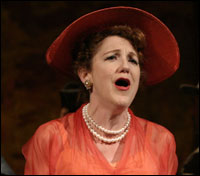WHEN VICTORIA CLARK brings down the final curtain on The Light in the Piazza with a desperate elegy for loving, “if you can,” a jolt runs right up your spine. It’s a stunner of a performance, a particular kind of heartbreaking, intimate experience that could only happen in a live setting. That the rest of Piazza (playing through Saturday, July 19 at Intiman Theatre, 206-269-1900) isn’t as perfect doesn’t seem to matter once Clark has rooted you to your seat. But more on that later.
Based on a ’60s novella by Elizabeth Spencer, Piazza is a world premiere musical about the illusion of love and whether that clouded, dreamy vision should be accepted as more real than the cold facts that surround it. Carolina women Margaret Johnson (Clark) and her daughter Clara (Celia Keenan-Bolger) are visiting Italy in 1953: Protective chaperone Margaret is bruised by the absence of her busy tobacco executive husband (Florence was the site of their first blush of love); sheltered 26-year-old Clara feels the possibility of a new life for herself. In a nice effect, a breeze sends Clara’s hat sailing across the stage and into the fateful hands of Fabrizio Naccarelli (Steven Pasquale), a handsome young Florentine who knows how to make the most of an opportunity.
When the show is at its best, which is often enough, Piazza is just like that chapeau’s trip through the airan ephemeral journey toward something of promise. The adaptation by director Craig Lucas is careful not to say too much, sometimes leaving the feeling that it needs more meat on its bones, while other times perfectly capturing the compelling mystery of silence. We don’t get a lot of Fabrizio’s family: Signora Naccarelli (Patti Cohenour, a bit grand) means nothing to us, while her slick husband (a very smooth Mark Harelik, avoiding caricature) is more intriguing for what we don’t know about him. There’s also room for a truly fine supporting turn by Kelli O’Hara as Fabrizio’s despairing sister-in-law, a jaded young wife infuriated and devastated that she’s lost the devotion of her womanizing husband (playfully roguish Glenn Seven Allen).
Adam Guettel’s shimmering art songs, played by four deft musicians onstage, have the deceptively simple richness and lush, golden hue of the summer in which they’re set (kudos to lighting designer Christopher Akerlind for his resonant nuances). Some of the denser melodies, depicting the conflicted melodrama of Fabrizio’s family, won’t work for everybodyin fact, I’m not sure how much they worked for methough their jagged edges are smart, intentional contrasts to what Guettel elsewhere establishes as the sound of young love.
Something crucial is missing in the first act, however. You’re only truly invested in the chemistry between Clara and Fabrizio insofar as Clark’s narrator demands you be. Warm-voiced Pasquale is dashing and has an ingenuous way in a role that could have been drippy, but Keenan-Bolger is a bit offand not in the way she’s supposed to be. There’s a secret about Clara that Margaret would rather nobody know, and once it’s revealed, you don’t look back and think, Well, yes, of course. It’s an ineffable quality that Keenan-Bolger is gamely trying to communicate, but her efforts become a little more grating than anyone intended. It’s only when the actress’ singing voice hits its upper register and suddenly seems to strengthen and expand into something more that you sense the same awkward grace that Fabrizio must see in Clara. Don’t blame the actress completely: Neither Lucas nor Guettel have the character completely down yet.
They certainly know Margaret. Though he hasn’t found an assured way to integrate larger issues like movement into the show (Pat Graney’s one big piece of choreographya Naccarelli family number that opens Act IIsticks out like a sore thumb), Lucas’ direction communicates every intimate detail of a wife and mother’s bittersweet personal struggle. When Margaret calls her husband with worried news of Clara’s burgeoning romance, the carefully modulated pauses leave no doubt that the real pain comes from the flame that’s gone out back home. And Guettel is achingly articulate here: Margaret hangs up to bemoan her husband’s chill and sings, “I can see the winter in your eyes telling me, ‘Thank you. We’re done here.'”
In Clark’s hands, that hurt becomes the main reason to watch. “Fable,” Margaret’s bracing show closer, is the elegant, more refined flip side to “Rose’s Turn” from Gypsyas if Mama had lost all her personal ambition and were instead begging her daughter to find her own prizes in life. Clark is magnificent in the kind of bravura turn you hope to see at least once in the theater, yet she manages to avoid false showiness. The actress subtly depicts Margaret’s quick wit and craftiness as defenses against an emotional implosion, and when she finally does break inside, you’ll remember that moment the rest of the season.








